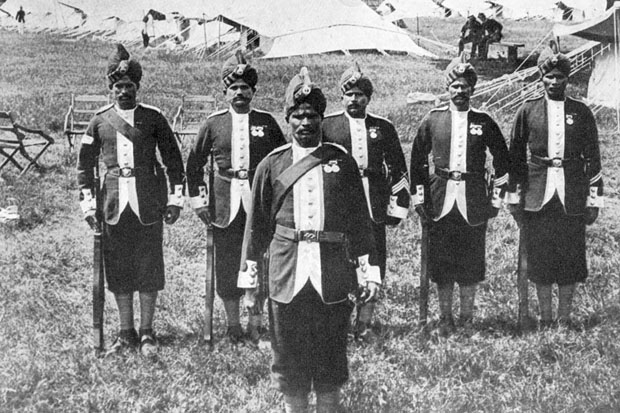At six o’clock on 31 May 1916, an Indian soldier who had been captured on the Western Front alongside British troops and held in a German PoW camp stepped up to the microphone and began to speak. Not in Hindi or Urdu, Telugu or Marathi but in perfectly clipped English. He tells his audience, a group of German ethnologists, the biblical story of the Prodigal Son. That his voice still survives for us to listen to, clear and crisp through the creak and crackle of time, is an extraordinarily emotive link not just back to the Great War but to the days of Empire.
In The Ghostly Voices of World War One on the BBC’s World Service (produced by Mark Savage) Priyath Liyanage told the story of these soldiers, who fascinated their German captors because of their ‘exotic’ turbans and kurtas. They became objects of study and were let off their labours for the day while the researchers recorded their voices using the latest technology (Edison’s wax-cylinder phonograph). They wanted to study their use of language, their pronunciation. Not just for science. The recordings were also to be used once the war was won (by the Germans, of course) as language training for the officers who would be working to create an even bigger German empire and would need to understand the local dialects.
After the war the recordings were lost, seized by the Russians and taken to Moscow, but eventually they were returned to Berlin where Liyanage went to listen to them in the hope of finding out who the soldiers were and tracing them back to their homes in northern India. It proved a lot more difficult than he anticipated. The recordings were surprisingly methodical, with not just the date but the precise time noted as well as the names of those who were speaking. Photographs, too, were taken. But since many of the soldiers were from tiny villages up in the mountains, very often illiterate and with no tradition of keeping written records, there is little real chance of being able to find their descendants now, 100 years later. When Liyanage travelled to the place where the soldier who talks about the Prodigal Son was supposed to come from, the villagers to whom he played the recording told him, ‘It creates a sense of doubt.’ His English was too good, too well educated.
Liyanage, though, persisted. Another of the voices sings devotional songs in Urdu. He plays the recording to an 89-year-old who might well be the singer’s son. The man is visibly moved. He cannot be sure that the voice is that of his father but the song is familiar, and his father was in the army and in France. In a mysterious way he has been given a direct connection with his past. ‘Sometimes,’ he tells us, ‘these moments cannot be defined in words.’
The recordings have also mysteriously survived as another kind of war memorial, reminding us that more than a million Indian soldiers volunteered to fight in Europe in a war with which they had no real connection. Sarfraz Manzoor told their story on Radio 2 on Saturday (in a programme first broadcast on the Asian Network). Forgotten Heroes: The Indian Army in the Great War (produced by Philippa Geering) reminded us that the Indian soldiers arrived in Europe in September 1914, just a few weeks after the declaration of war. It would take months before the British volunteers were ready to fight. The Indians on the other hand were well trained. Some of them would find themselves in Palestine and Mesopotamia fighting against their fellow Muslims, yet they carried on in the most appalling conditions of heat and starvation.
Frank Cottrell Boyce was also asking us to remember these lesser-known voices from the past in his feature for Radio 3 God and the Great War (thoughtfully produced by Rosie Dawson). He set out to unearth stories from 1914–18 that are not usually recalled (or are remembered for the wrong reasons). What about the thousands of teenage girls who were sent up to Gretna Green to work in the highly secret munitions factory, manufacturing cordite by soaking cotton wool in nitroglycerin? It was very dangerous work, they laboured long days and were very young. Off the leash they tended to look for fun, annoying the locals. Yet they were an essential part of the war effort, and fearless.
He looks through the back issues of a parish newsletter created by a Sunday-school teacher in Everton. A soldier reports from the front, one of three brothers, one of whom has just been killed. He writes that he had never understood that text ‘O death, where is thy sting?’ But after being in the trenches, he now realises death is a small thing. ‘It’s all right. It’s just death.’
Out of these individual griefs, says Cottrell Boyce, we build each November ‘a common silence …like a brief, invisible cathedral. If we stand beneath the dome and really listen, we can hear still faintly the echo of their voices.’






Comments